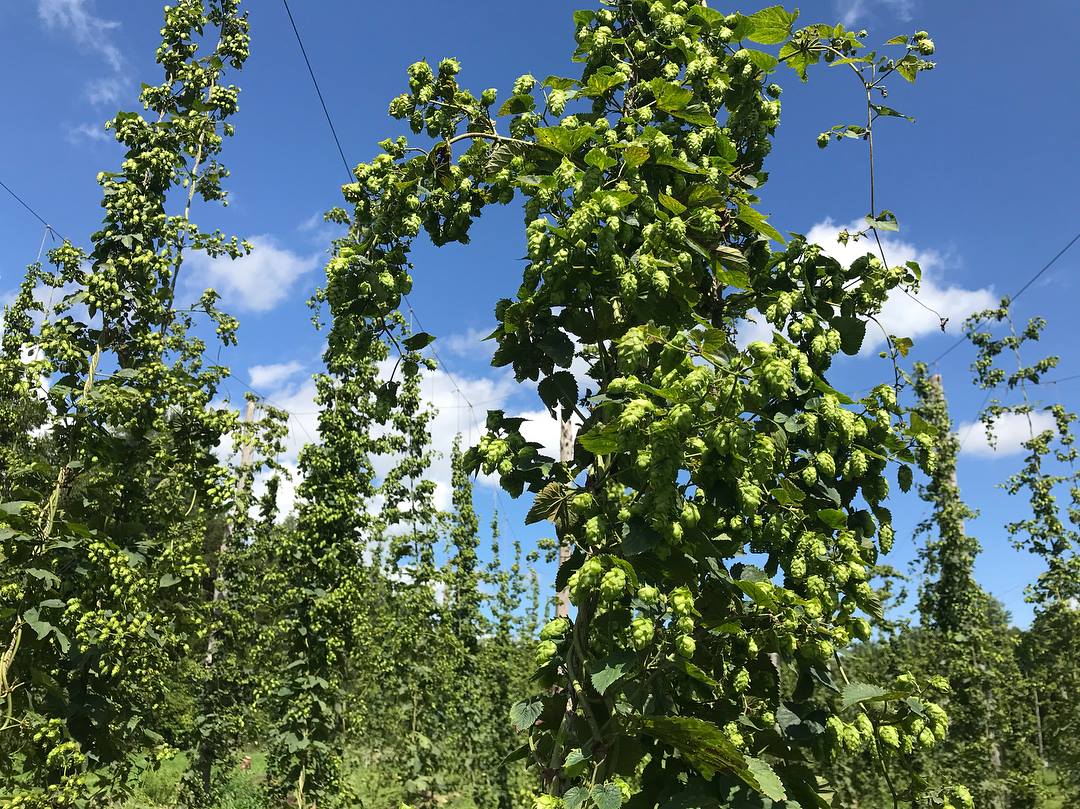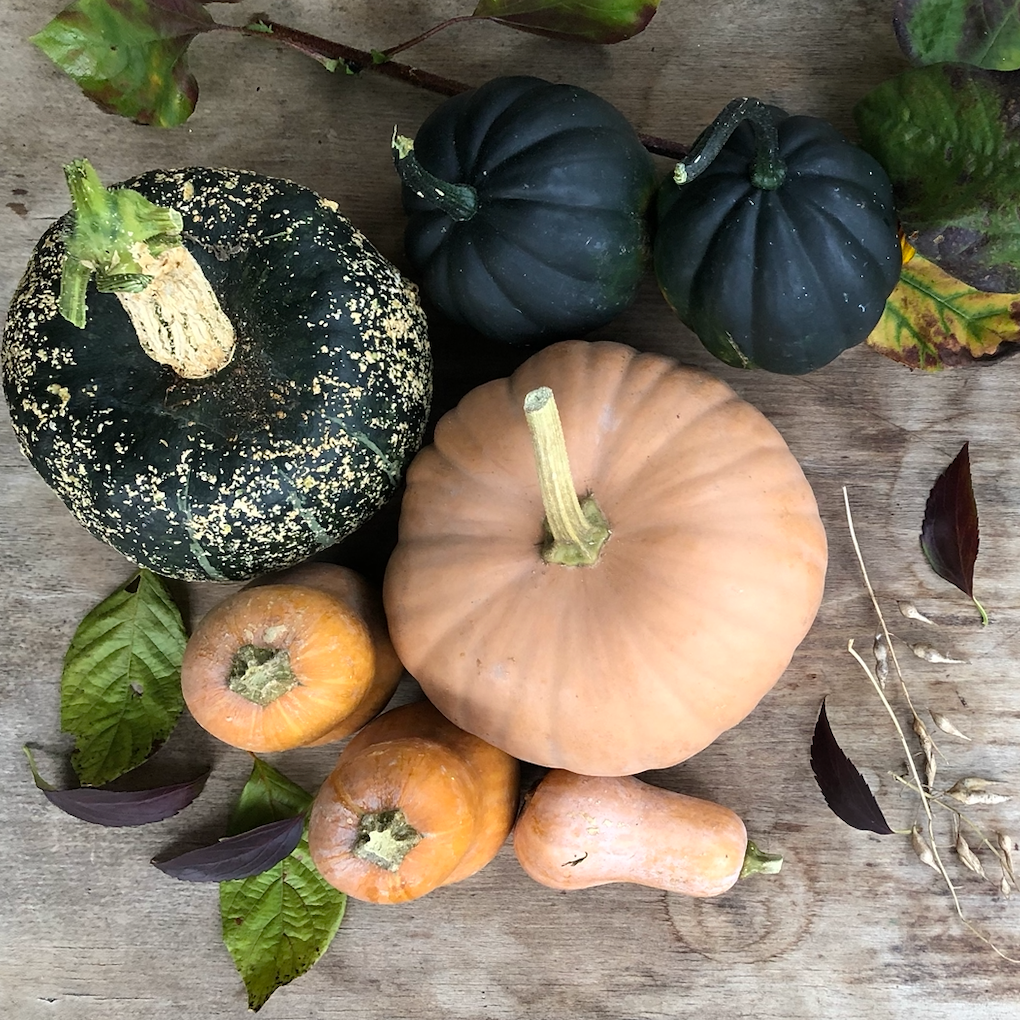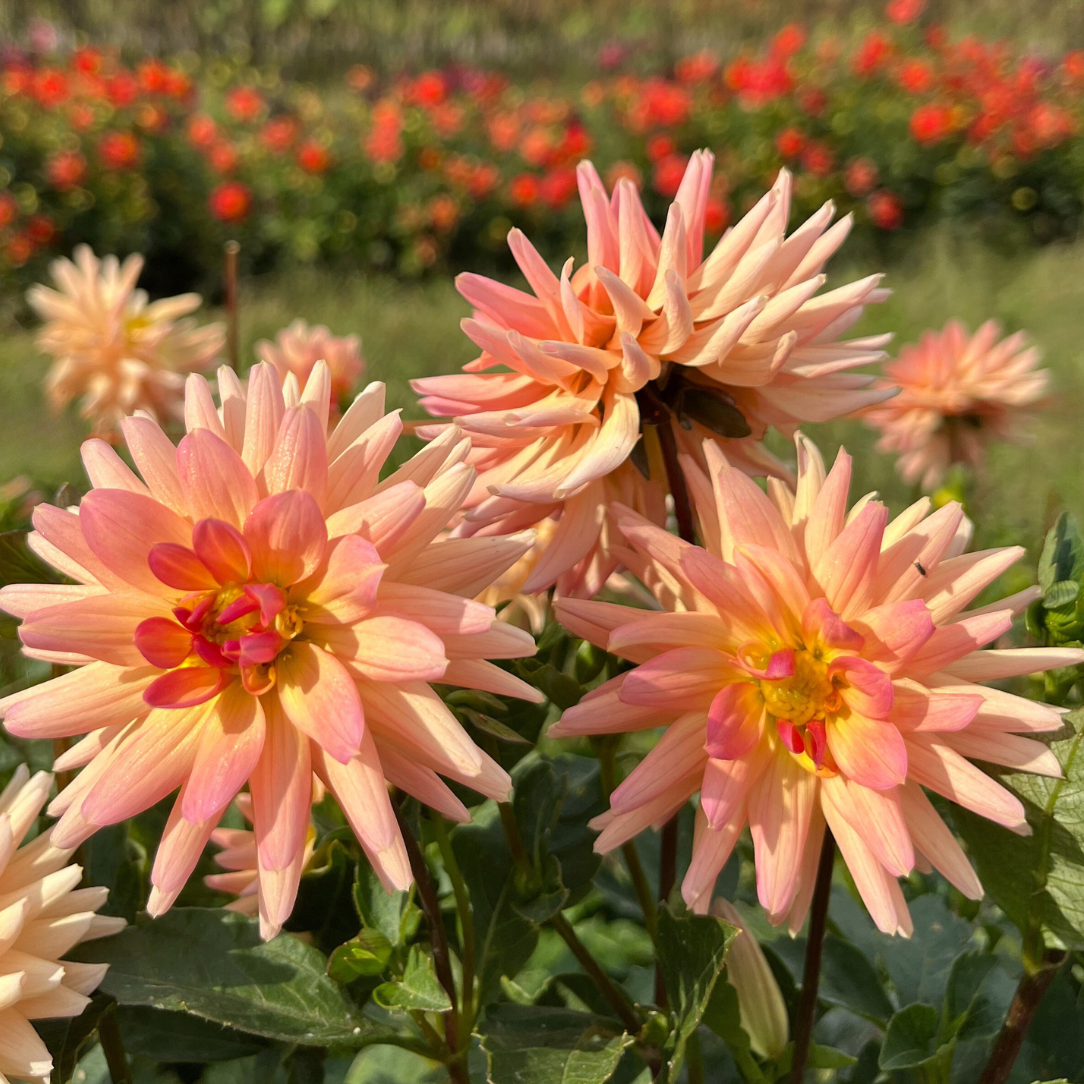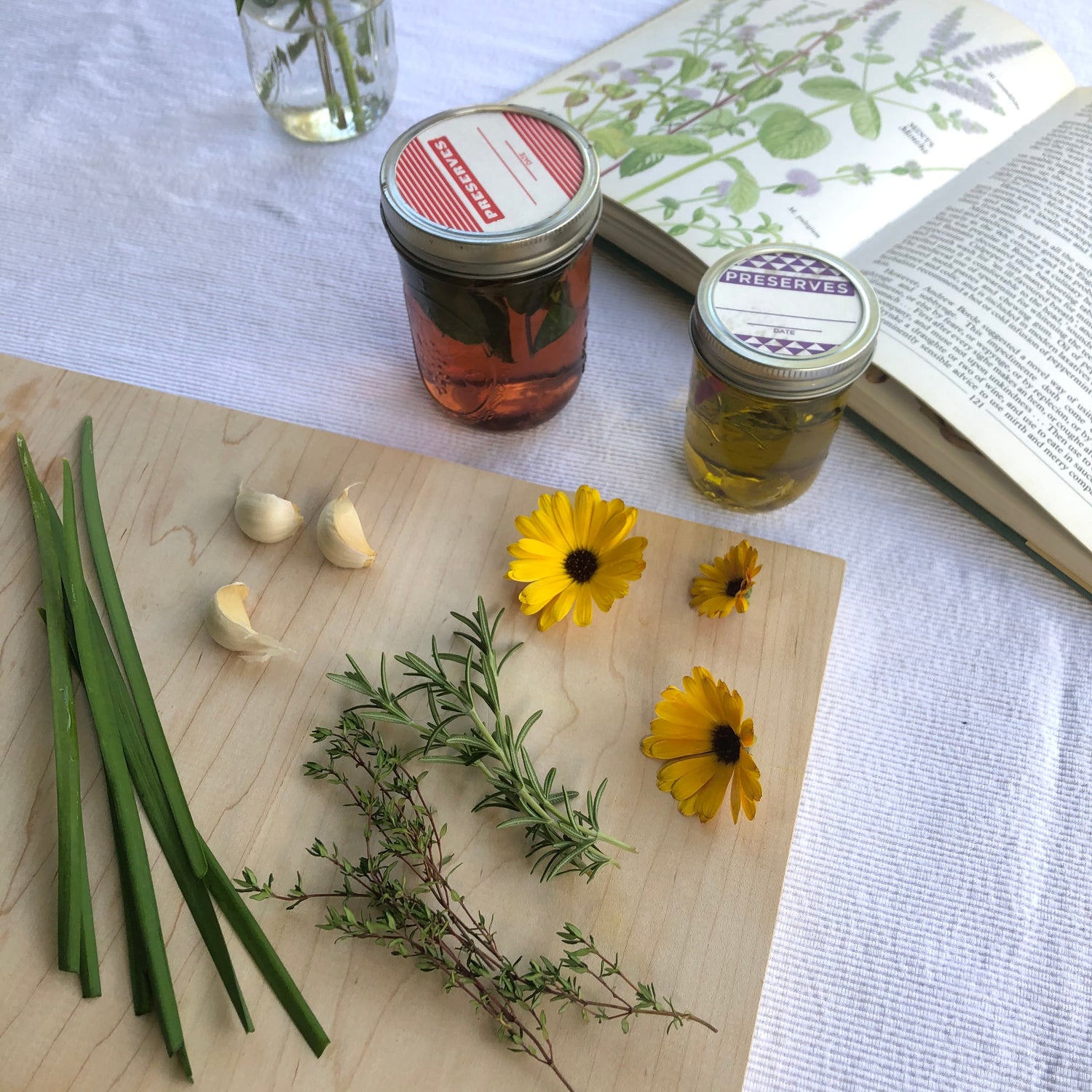 Arrowood Farms is a farmhouse brewery located in the heart of the Hudson Valley in Accord, NY. In fact, it's just over a mile from our farm office and is one of the perks of being a Hudson Valley Seed Co. employee! Here they cultivate many of their own organic hops, grains and native fruits – with help from their bees. They produce clean and classic beer as well as wild and mixed culture ales to express a sense of time and place. Agriculture and nature inspires their approach to NYS terroir-driven beers and they celebrate ingredients native to the Hudson Valley.
Arrowood Farms is a farmhouse brewery located in the heart of the Hudson Valley in Accord, NY. In fact, it's just over a mile from our farm office and is one of the perks of being a Hudson Valley Seed Co. employee! Here they cultivate many of their own organic hops, grains and native fruits – with help from their bees. They produce clean and classic beer as well as wild and mixed culture ales to express a sense of time and place. Agriculture and nature inspires their approach to NYS terroir-driven beers and they celebrate ingredients native to the Hudson Valley.
We caught up with co-founder Blake Arrowood to learn about what's involved in creating a Brewer's Garden.
 Head brewer Matt Schulze
Head brewer Matt SchulzeFrom the get go you've been focused on brewing "from the ground up". Can you talk a little about the experimental process of brewing with flavorful plants from the garden? I imagine it's a bit different than experimenting with flavors in the kitchen!
The Farm has been our foundation from day one. We started as a hop farm, raising ducks for the nitrogen-rich waste to use as compost on our hops. We were out to find connections in our process that ultimately ties back to the land. With mass production and the times we live in it's easy to become disconnected from our food and drinks. One of our main goals has been to tell the story of beer – how it's crafted and the folks behind it all - from the farmers who grow the hops, to the maltsters who malt and so on until it reaches its ultimate destination into a glass. 'Beer From the Ground Up' was our natural tagline.
 Brewing with foraged juniper.
Brewing with foraged juniper.The Brewer's Garden was a concept we'd read about when first planning the Farm Brewery. It made perfect sense to grow – at least starting on an experimental scale – different herbs, flowers, fruits and botanicals to use in our craft. To be honest, it's been a challenge to figure out how best to extract the essence of plants to do what we intend, whether it's in aroma or flavor. We've looked into creating teas and steeping at various temperatures to extract the essence and aroma without the bitterness and undesirable vegetal qualities. With that, it's also figuring out how to strike a balance between the malt bill. Locally sourced malt is so flavorful it can present challenges for competing expressions and that's something we're continuing to navigate. Curiosity, patience and experimentation are the roots of our R&D process.
Have there been any big surprises?
A disappointment has been with sage. We really wanted to get sage into something and that hasn't proven to work out quite yet.
On the foraging front:
 Sumac growing on the farm.
Sumac growing on the farm.- Sumac: local Staghorn Sumac grows around our property and has been really interesting. It's a super expressive plant: vibrant and bright - lemony and tart.
- Juniper: We've been foraging juniper berries and branches from around the property and using in a few different beers. Again, super expressive, lending itself to a bright citrus, piney and grapefruit flavor.
- Dandelions: they're everywhere in the spring and has made for one of our favorite seasonal saisons. All hands on deck for this one - we picked over 50 pounds of dandelion flowers last spring for a rustic saison that we plan to recreate in the season's to come. Some folks also use their roots for a heavier beer like a stout in place of coffee.
 Foraging dandelions.
Foraging dandelions. The strawberry patch.
The strawberry patch.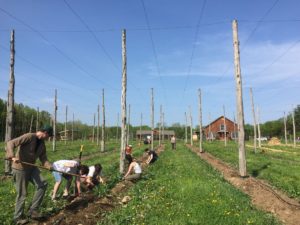 Team Weeding
Team Weeding
In our Brewer's Garden there have been a few plants that have been a lot of fun. Strawberries are one of summer's best treats and can also translate really well into Belgian style beers, especially if juiced and allowed to age in oak. Lemongrass and coriander and Belgium farmhouse staples that have faired well in our growing season. Coriander is great because it will reseed itself and keep coming back. Borage was also a really fun surprise, incredibly beautiful plant and has this delicate cucumber flavor that we're playing around with. Tulsi was another great surprise. It seems to explode in the late summer and there are these really nice – almost blueberry, floral qualities.
What are your top variety/plant recommendations for starting a brewers garden?
 Tulsi growing on the farm.
Tulsi growing on the farm.Anise Hyssop
Borage
Chamomile
Coriander (cilantro)
Hops
Lemon balm
Lemongrass
Lemon Verbena
Rhubarb (Sour ales)
Rose Hips
Strawberries
Tulsi
Any basic tips for home brewers?
1. Take your time and be prepared for you brew day. Plan for about twice as long as you anticipate. There's as much cleaning as there is actually brewing.
2. Take good notes - if you end up with a bad batch it will be easier to track down the culprit if you keep track of it all!
3. Don't be afraid to experiment (that's where those notes come in to play!)
 Arrowood Farm Brewery: Dandelion Saison*
Arrowood Farm Brewery: Dandelion Saison*
Homebrew recipe: For a 5 gallon batch
Original Gravity: 1.052
Final Gravity: 1.006
Alcohol by Volume: 6.0%
IBU: 20 derived from hops, ~10 from dandelions (educated guess!?)
60% Pilsner
23% Rye Malt
13% Vienna
4% Wheat Malt
- Mill grain and mash at 149 degrees F for 60 minutes
- Boil wort for 90 minutes to drive off volatile compounds from Pilsner malt (or substitute 2-row pale for pils and boil for 60 minutes)
- 0.5 oz East Kent Golding hop addition with 60 minutes remaining in boil (Fuggle hops are acceptable substitute for EKG)
- 0.5 oz East Kent Golding hop addition with 5 minutes remaining in boil
- Chill wort to ~165 degrees F and steep 8 oz freshly picked dandelion florets (minimize stem or leaf content to avoid excessive bitterness) for 30 minutes
- Chill wort to 75 degrees F and transfer to sanitized fermenting vessel
- Aerate wort and pitch healthy culture of your favorite saison yeast
- Monitor fermentation by checking the current gravity against the original gravity using a hydrometer and graduated cylinder
- Allow fermentation 4-6 weeks to run its course
- When gravity readings are consistent across 7 days, package with desired amount of priming sugar in bottles or keg
Additional brewing tips:
- Avoid direct sunlight exposure to beer through clear or green glass! This will result in 'skunked' flavor caused by hop compounds reacting with ultraviolet light
- Avoid excessive oxygen exposure at any point in the fermentation or packaging process to avoid stale off flavors and ensure maximum fresh dandelion aroma and flavor!
*If you have any questions, Arrowood have kindly said that you can reach out to their head brewer: Matt Schulze at matt@arrowoodfarms.com
Arrowood Farms Accord Tasting Room reopens on Friday, 1 March. Visit them at 236 Lower Whitfield Rd, Accord, NY. Or visit them in New Paltz at 3B Church St., open year-round.


